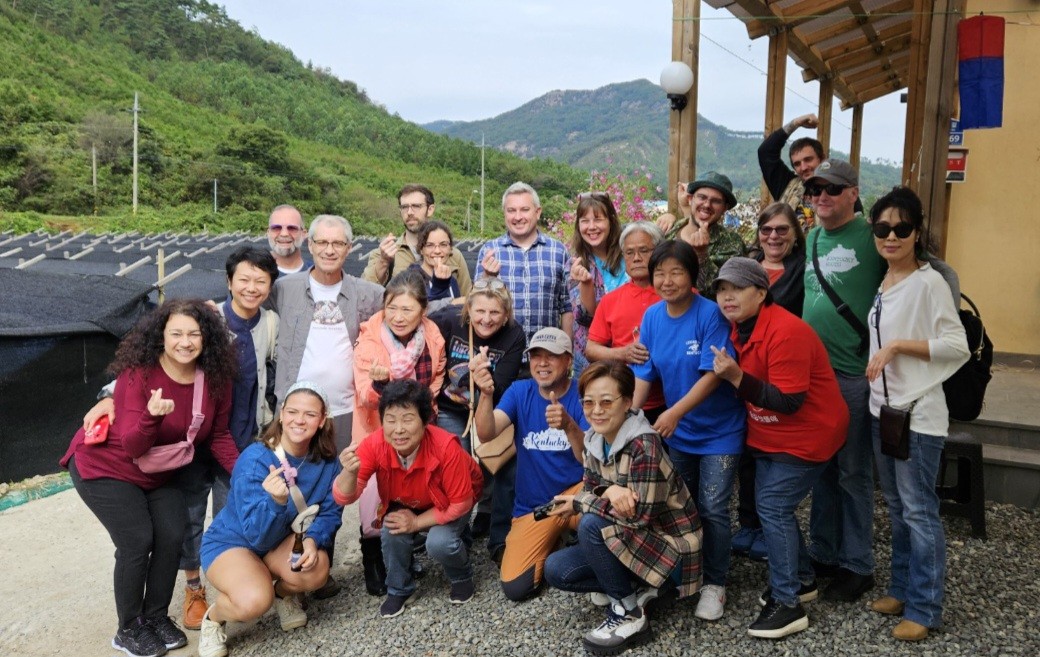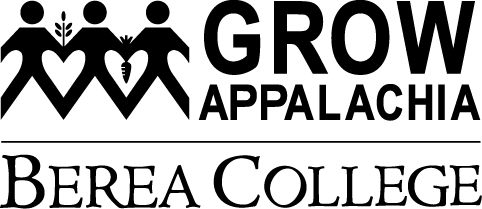Earlier this year, Cowan Community Action Group received an incredible invitation to travel this fall to South Korea on an agricultural based cross-cultural exchange program led by Jeong Hyun An (Ann Montgomery). An and Cowan director Valerie got to know one another and each other’s work while serving on the Community Farm Alliance board.
An is passionate about cross-cultural exchange between her Korean and Kentucky homes. She took Kentuckians on trips to Korea in both 2014 and 2019, and recently created a non-profit, BaeNaChi, to grow this work. BaeNaChi is an acronym of three Korean words (Bae-oom 배움, Na-noom 나눔, Chi-yu 치유) meaning respectively learning, sharing, and healing. Through BaeNaChi, An works to foster global and cross-cultural relationships and connections that lead to regenerative community development. There is much more to BaeNaChi, which you can read all about on their website here – https://baenachi.org/about.
At Cowan, we talk a lot about community. Often, looking outside ourselves and our immediate community helps us to see the everyday realities, challenges, and celebrations we live in a different light. Our perspectives widen, our preconceived notions are challenged, and through connections with those different than ourselves we begin to see more possibilities. The struggles our community and region are facing are not isolated only to us. In fact, there are so many places around the world bracing themselves for increasingly intense climatic events including historic flooding, or navigating economic challenges as industry changes, and dreaming to transform rural areas into places where our community members thrive. We often hear the quote, “Think globally, act locally,” but it’s easy to get caught up in the local, and not to see how deeply we are connected with those who speak a different language, practice a different religion, eat different foods, and understand and move through their worlds in starkly different ways in a place on a completely opposite hemisphere. But more and more, we are all facing strikingly similar realities, and when we open up the space to learn how each of us is managing the same issue, the possibilities for innovative solutions grows enormously.
We believe that cross-cultural connection making and understanding, both at home and abroad, are not only key to helping us creatively address challenges we are all facing, but crucial to growing community across the forces that do their best to divide us all. We are so grateful for the opportunity to experience Korea through BaeNaChi, and we’d love to share some highlights from the trip with you.
October 10th: Korea – U.S. Agro-Healing Exchange Symposium in Seoul
Less than 24 hours after our feet landed at the Incheon Airport in South Korea, we made our way to Seoul’s City Hall for the Korea – U.S. Agro-Healing Exchange Symposium, organized by An and Leah Han. Leah was one of our most important in-country community partners, and who had worked closely with An in curating the Seoul portion of this year’s program. Leah runs Han Medi Farm, an urban farm and care farm in Seoul. Through the nerves and jet lag, a few of us (Leandra Forman from Food Chain, Dave Close from Virginia Tech Extension, Kelsey and Val from Cowan) presented on their work. We heard presentations from Yewon Cho, a researcher at the Care Farm Research Institute, Dr. Junghoon Lee who runs Telofarm, a hightech farming start-up that researches and develops precision based agricultural practices using microsensors, and Dr. Gwangjin Kim, Head of Urban Agriculture at the National Institute of Horticultural and Herbal Science. Dr. Lee’s team brought in cherry tomatoes that they had grown using the readings from their microsensor systems that allow them to know the precise amount and necessary timing for watering the plants. Through this precise watering, the Telofarm team grew extremely healthy and prolific plants that produced tomatoes with more than double the amount of sugar than other tomatoes. We can testify that it was one exceptional tomato!
The other presentations focused on agrohealing (from my understanding meaning more or less the same as therapeutic horticulture, but maybe a broader umbrella of all things healing in an agricultural space) is understood in Korea and practiced. Agrohealing is a hot topic within Korean agriculture right now, and farm facilities can access government supported programs to provide care-based agriculture for certain populations. Leah’s Hans Medi Farm, is a perfect example of a thriving care farm facility in Seoul that provides agrohealing programming for local seniors managing dementia.
After the symposium, we headed to Hans Medi Farm for our first welcome party. The view from the farm shows mountains that look strikingly similar to those in Eastern Kentucky, and would only look more and more like home as we moved through more rural Korea. Hans Medi Farm is a beautiful space, full of all sorts of gardens, a rice paddy demo garden, and a large indoor space that serves as the classroom, kitchen, and office space. Over an incredible supper cooked by our hosts, we got to know those from the Agrohealing Symposium better as well as met more folks involved in Korean foodways work.
October 12th: International Symposium on Climate Crisis Action and Care Farming
We were special guests at the opening day of the International Symposium on Climate Crisis Action and Care Farming. This annual symposium brings together thousands of attendees and representatives of government agencies and agricultural companies from over 30 countries throughout its 11 days. Valerie (Cowan), James Stapleton (Appalachian Groundswell), Dave Close (VT Extension), and Leandra Forman (Food Chain) sat on panels addressing challenges within local agriculture in terms of climate and community health/healing. Presenters from Korea, the Netherlands, and India spoke on this as well, presenting general information about their work. The day’s symposium was opened with a special welcome from Kentucky Commissioner of Agriculture, Ryan Quarles, and closed with musical performances that included our very own Tommy and Yoko playing Old Time music alongside Korean musician Genie Park.
Oct 12 – 14th: Host Community in Sunchang
Annual Gochujang Festival
What a food celebration! For those unfamiliar with Gochujang, it’s a fermented red chili paste that along with soybean paste make the foundation of traditional Korean cooking. Upon arrival, we were greeted with doorways, sidewalks, and large lots covered in onji, the ceramic pots used for gochujang fermentation. At the festival, we walked along the lines of tents and were invited to an incredible lunch by our hosts. Festival eats included scallion pancake, noodles, gochujang, and would you believe it, deep friend ginseng root.
Community Day at Mr. and Mrs. Bark – Gochujang & Kimchi Making!
Mr. and Mrs. Bark were two more of our in-country community partners who did so much to make us all feel at home in Sunchang. We spent an entire day on their farm. Walking from the bus to their house, we got a glimpse at some of his production. A sea of shade covers protected that year’s ginseng, which sadly didn’t establish like they’d hoped. When asked why, the Barks responded, “Climate change.” Typical crops we saw at The Barks, farms, and gardens were cabbage, soy beans, rice, other brassicas, fruit trees like jujube, persimmon, and Korean raspberry. At the Barks, we learned how to make gochujang and kimchi together. What an awesome process! Later on at supper, curated by a world famous gimbap chef and Mrs. Bark, we ate the very fresh kimchi and gochujang we made together. The Barks went all out, and invited musical groups from the area to perform for us. It was a beautiful day made special by the love the Barks and community members put into such a warm welcome.
Thank you BaeNaChi, global, and local community partners!
We are deeply grateful to An, Rick, and BaeNaChi for building this opportunity and bringing us into the fold. To all our new Korean friends and community partners, thank you for opening up your homes, gardens, schools, projects, and community centers to usher us in with the biggest, warmest welcome. Your hospitality and generosity blew us away, and we can’t wait to welcome you to our Kentucky home! Know that you always have community and home here with us. It has been an enormous amount of work on part of BaeNaChi and our host communities to make this all happen, and we are left full of deep gratitude and inspired by all of you.
We were fortunate to travel with such wonderful people. Thank you Commissioner Quarles for your enthusiastic support and representation. Thank you Leandra, Adam, Tonya, and Dave– we are thrilled that we get to be a part of this work with such spectacular individuals and dedicated community organizations. Thank you to our local community members who joined us – Eric, Timothy, Louise, Tommy, James, Angie, Ellie, and Yoko – who took a big leap (first leap abroad for several of them!), stretched their comfort zones, and took this journey with us.
A heartfelt thank you, each and every one – you all made this trip unforgettable. And we cannot wait to see how we and our communities, separated by over 7,000 miles of the globe, GROW TOGETHER.
Thank you Letcher County Culture Hub for connecting us with The Chorus Foundation whose funding made this trip and the beginning of growing our community across the world possible for us and our community!



Leave A Comment